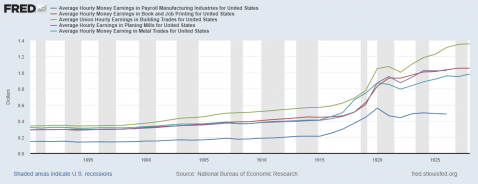
A recent post by the St. Louis Fed, The Economic Effects of a Pandemic, discussed the economic effects of the Spanish Influenza of 1918-1920, referencing the chart, embedded herein, of average hourly earnings in various United States sectors.
According to the Centers for Disease Control and Prevention, the Spanish Flu pandemic infected about a third of the population of the world, killing 50 million or more people in the process. As one would expect, it had economic effects, as well.
The graph herein displays hourly wages for various trades within in the United States. A morbid feature of this data is a run-up of wages from 1918 to 1920, followed by a drop with the recession of 1921, consistent with the economic theory behind a sudden loss of population, i.e. a drop in labor supply. A similar effect has apparently been observed for the Black Death. Like I said, morbid…
Any student of history will note that in the case of the Spanish flu its effects are surely entangled with those caused by World War I. However a St. Louis Fed Review article and other work by its Thomas Garrett has indicated not all U.S. cities were affected in the same way by the Spanish flu or by WWI casualties and, exploring these differences, the effect of the Spanish flu on wages was real and in fact larger than the effects of WWI.
So what does this mean for today, for a world much different than 1918? Who knows, frankly. One would think the industrialized world is much more capable of dealing with such; I certainly land in that camp. The counter would be, however, that the world is more interlinked than then, causing more issues.
Addressing the morbid effect on wage growth more directly, it is worth noting that fatalities seem to be highly concentrated in people generally out of the workforce (retired) already, which might mitigate such an effect. Personally, as this feels like a movie, I’m waiting for the part where Bruce Willis swings in on a rope screaming “yippie ki yay mother ducker” and fixes all this.
Like this (pardon his mispronouciation of “ducker”):
